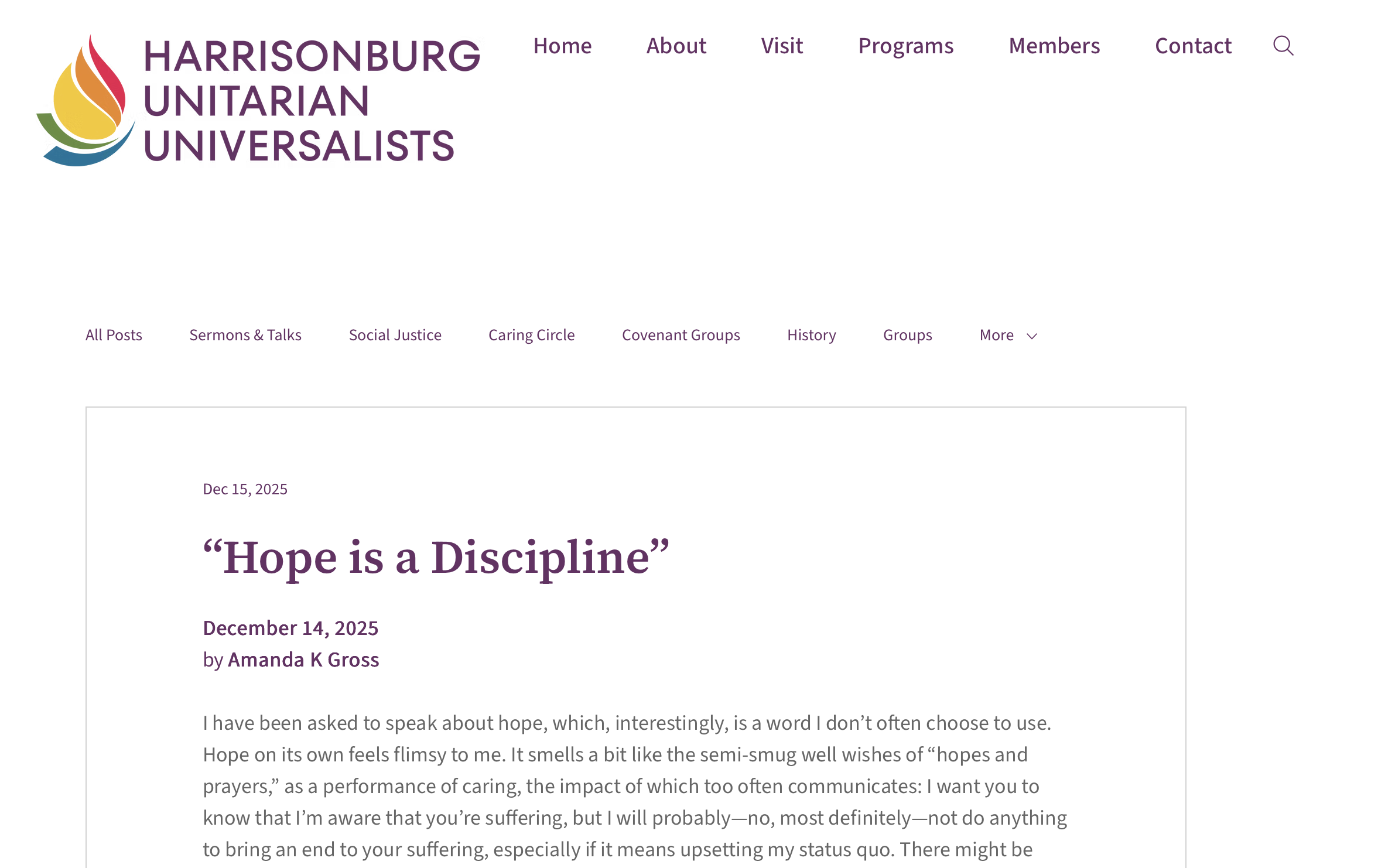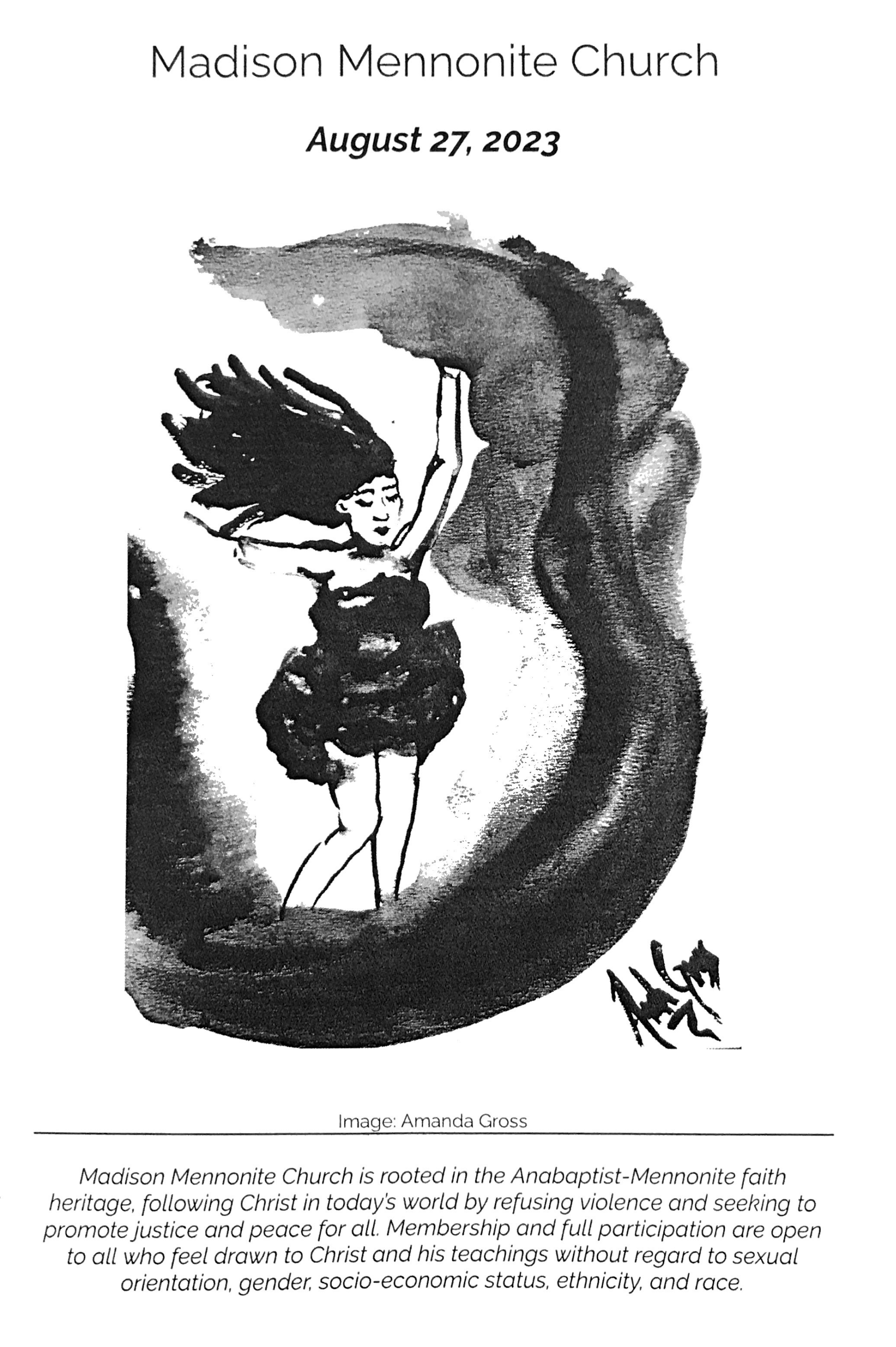Sermon Series
“Hope is a Discipline”
On December 14th, Amanda spoke at the Harrisonburg Unitarian Universalist Congregation on the theme of hope.
To read the full message text, visit the UU’s page here.
Thinning the Veil
March 2, 2025 at Portland Mennonite Church
What are the barriers—or veils—that keep us from more fully experiencing God's kindom and raising our collective consciousness in this time of chaos? And for Mennonite communities marking the 500th year anniversary of Anabaptism, how have Eurocentric Chosen Traumas/Chosen Glories maintained a dominant righteous martyr narrative? How can we interrogate the stories we’ve been taught about who we are and to what and whom we belong? What are the ways we are in denial of God’s kindom? How might we be denying it?
Scriptures Referenced: Exodus 34:29–35; 2 Corinthians 3:12–4:2
Sermon Series
A Menno-what?!:
Upsetting our Narratives
in a Time of Upset
February 2025 at Columbus Mennonite Church
Amanda shared as part of CMC’s Interweaving Indigenous Histories series. Watch Sunday’s Sermon here.
Scriptures Referenced: Luke 7:18–35 and Psalm 146: 5–10
Sermon Series
Returning Home
June 2024 at Atlanta Mennonite Church
Reflections on returning to my home congregation after over two decades away.
Read the full sermon text here.
Scriptures Referenced: Luke 4:21–30 and Luke 8:26–39
Sermon Series
The One You’re Looking for: An Organizing Sermon
June 2024 at Neighborhood Church ATL
How can we more fully see, know, and accept all parts of ourselves, of our histories, identities, family systems, positionalities, and cultural contexts?
The People’s Institute says a really good organizer helps a community get a sense of their collective power. That is, the power that we already have. The ironic thing about leadership development is that you can’t really “empower” anyone. It’s really more about supporting and challenging people and communities to nurture the leadership that’s already within.
So the question then, is how? How do we help each other get a sense of our own power?
Read the full sermon text here.
Scripture Referenced: 1 Samuel 15:34-16:13
Sermon Series
Healing Practices: The Day-to-Day of Being with Hard Things
April 2024 at Ridgeview Mennonite Church
Collage image by Amanda K Gross
What does Jesus’s teaching reflected in Luke 13 have to offer the themes of multigenerational trauma healing, decolonization, racial justice, and the practice of prayer? How can we embody prayer?
Read the full sermon text here.
Listen to the audio here: 240421_0063.mp3
Scripture Referenced: Luke 13: 10–13; 18–21
Embodying Reparations
Sermon Hour: Why Mennonites Can't Dance: Co-Creating Embodied Resilience for the Beloved Community
Watch the full service above
In this sermon, I shared stories about reparations work happening in Asheville and Buncombe County, NC, the indigenous land of the Cherokee people, in which both the city and county have passed ordinances to stop continued harm, acknowledge and apologize for past harms, and seek repair through an ongoing reparations for Black residents.
As a white person canvassing in majority-white spaces for the Racial Justice Coalition’sReparations Are Due Campaign, I’ve become especially attuned to body language and the ways white-bodies people responded to the word reparations, often by tensing up or restricting their bodies. Working with the body has become a significant part of my anti-racist organizing, particularly as a white-bodied person of European Mennonite descent doing a lot of work with other white-bodied people.
In my sermon, I looked at another story about bodies: the story of the bleeding woman and Jesus, which appears in three gospels. I read it as a story of self-determination on the part of the suffering woman who, despite being mis/undiagnosed by institutional healers for years, still had an internal knowing that she would find healing if she could position her body close to Jesus’s. In this story, Jesus also offers an example of embodiment. Though the woman’s touch was slight and despite the pressing crowds, Jesus felt the energy go out from their body the moment she touched their clothes.
Are we attuned to our bodies? What do our bodies need in order to open towards healing and repair? How might defensiveness show up in our bodies? A clenched jaw? A closed chest? Crossed arms? What could we offer to ourselves—to our bodies—so that we might be able to more fully receive the self-determination of others?…So that we might be more able to offer repair?
You can listen to the audio recording of the sermon here.
Referenced Scriptures: Luke 8:43-48 and 1 Corinthians 12:12-26.
You can also sign the Pledge to support the Reparations Are Due Campaign here.
August 2023 at Madison Mennonite Church
August 2021 at Columbus Mennonite Church
Scripture and I have a pretty complicated relationship.
It was at church that I learned that the disappointment only comes when I open myself up to it. Since then, building up strong defenses has served me to reclaim my sense of Self. So why then would I want to open myself up to the potential violence of the lectionary or whatever else my bible google search results turned up?
But the years of practicing Raja yoga and following my body’s urges to take breaks, is beginning to soften something. I’ve begun to realize how my cultural somatic context has been shaped by whiteness through exposure to embodied spiritual practices that don’t come from my ancestry.
Read the full sermon text here.
Scripture Referenced: 1 Kings 2:10–12; 1 Kings 3:3–14; John 6:51–58
Menno Fabulous #1 & #2: Acrylic, by Amanda K Gross
Victim, Villain, Heroine by Amanda K Gross







